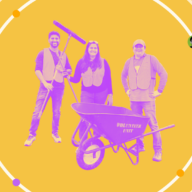Being late to the Monday 8am all-hands meeting wasn’t an option for Caely Montgomery. It didn’t fit the twenty-something’s type-A personality and how she operated as a business strategist for PeopleLinx. She usually arrived at the Philadelphia software company’s office by 7:30 – well before most other employees. On Mondays, though, there was more at stake. That’s when the company’s CEO, Natalie Egan – then known as Nathan – had a firm rule: Anyone late, even by one minute, couldn’t join the meeting. No excuses.
The edict exemplified Egan’s self-described “my way or the highway” management style. “One time, a guy was late to the meeting,” says Montgomery. And Egan asked him to publicly apologize to the entire team. “We all cringed, like, ‘This can’t possibly be happening,’” she remembers.
Episodes like this weren’t uncommon at PeopleLinx, a company Egan started in 2009 to teach large organizations how to leverage LinkedIn. “There were so many hoops to jump through, so many ways to avoid being embarrassed,” says Montgomery. Egan’s disciplinary approach was at the core of the company’s culture. PeopleLinx CFO, Rick Eastland (who is also married to Egan’s sister), says the environment could be very “Game of Thrones,” with a lack of transparency and trust which turned basic tasks into energy-sapping efforts. “My capacity for work would get gobbled up with concerns about what I could and couldn’t say,” says Eastland. “I would have to get approval from three or four different bosses who may not have really been talking to each other, just to report simple numbers.”
A thick funk of toxic masculinity also hung in the air. The bulk of PeopleLinx’s employees were a homogenous tribe of young, white men who hailed from Philadelphia’s wealthy Main Line. When one of them made a big sale, they rang a gong and tapped the office keg. Montgomery says she and the few other women in the office went along with it, rolling their eyes when Egan, the leader of the group, walked by. “One of my bosses there, Liz… she was VP of client success, just a really remarkable person, and she at times was being poo pooed or questioned. It was clear sometimes there was a feeling of like, ‘Little lady, you don’t know what you’re talking about.’”
Looking back now, Egan recognizes the lack of diversity. “It was just a bunch of bros, bro-ing each other up,” she says.
Despite the noxious culture, the start-up experienced explosive growth. Within 18 months, PeopleLinx had raised $3.5 million and gone from two to 50 employees. At the time, Egan says, it felt like the team was thriving. Montgomery remembers it differently.
“I want to say I did my best work there, but I didn’t. I always felt like I was doing something wrong. I came home at least once a week in tears,” she says. The environment colored her interactions with the rest of the team – a group of people with whom Montgomery otherwise enjoyed great relationships. “We made the best of it, but tension trickled into everything we did,” she says. She knew any ideas she brought to the table wouldn’t go anywhere. “We would just end up deferring to whatever management wanted.”
Egan ran the company under boorish micromanagement for five years. Then, in early 2014, LinkedIn dropped a bomb: they were revoking PeopleLinx’s API and access to their data, which meant that PeopleLinx essentially was left without a product. The company went into tailspin. Egan voluntarily stepped down as CEO. The next year, she was fired. At the same time, Egan’s marriage was crumbling. “I was facing divorce and I’d just been fired. I thought my life absolutely couldn’t get any worse. And then a week or two later I figured out I was transgender.”
Hiding and seeking
Natalie Egan first knew she was different when she was five years old. She’d been caught trying on pantyhose in her mother’s closet. Her mom wasn’t upset, Egan says, but still she knew “this wasn’t something boys did” and she swore she’d never do it again. Instead, she did exactly what was expected of her by her conservative family. She played sports. In high school (she went to an elite New England boarding school), she became one of the popular boys who dated the pretty girls. In college, she joined a fraternity where she partied hard.
Egan comes from a family of entrepreneurs (her father was CEO of a pharmaceutical company, her oldest brother helmed a software company), so she got her MBA. She also got married, had three children, and bought a house in the suburbs. “I did what everyone else wanted, everything I was supposed to do: I worked hard, I got married, I had kids, and then I was supposed to be happy.” But under the surface, she says she never really felt like she fit in.
Egan was still living on autopilot when things imploded at PeopleLinx. As things went from bad to worse, both at work and at home, Egan realized that her occasional cross-dressing habit was actually a struggle with her gender identity. It wasn’t a welcome realization. “I thought, ‘What am I going to do? I cannot burden my kids with this, I cannot burden my family with this. Everyone – my fraternity brothers, my employees, the community – they’d all invested in Nathan.’”
She didn’t think she’d ever work again.
She strongly considered suicide. She even had a gun. But the day she’d planned to take her life she bumped into a good friend. She confessed everything to him, and to her surprise, he encouraged her to embrace her identity. She started coming out to those closest to her. She was most scared to come out to her father and older brothers, but they quickly accepted her. It was the rest of society that didn’t. “I was 39, and experiencing bias, discrimination, and hatred for the first time,” she says.
That November, an encounter with a customer at a coffee shop gave her an epiphany. A woman in line muttered: “You people are disgusting,” and told Natalie that she was sick and needed help. “I watched her walk out of the store and thought, ‘If she knew my story, she wouldn’t judge me’,” says Natalie. “She would have empathy for what I’ve gone through. She might not relate to being trans, but everyone knows what it feels like to not fit in.’”
Egan decided it wasn’t enough to foster empathy in the people she encountered – she wanted to do it on a larger scale. Not just for the transgender population but for people from any marginalized community. And the best way she knew to achieve that was through technology. The seed for her new company, Translator, was planted.
Translating empathy
Montgomery was standing in line at Ulta, buying Christmas presents, when she got a surprising phone call. It was Egan. “She said, “I’m trans, and I just realized it. I think that you are a good person to talk to about that.” Montgomery was blindsided. “This was the person who would walk around in a sweatshirt holding a lacrosse stick and had a poster of Katy Perry on the wall.” Still, she agreed, and they set a date to get together a few weeks later.
Most of that evening was spent catching up and clearing the air. Egan explained how some of the aggressive behavior she had exhibited toward Montgomery at PeopleLinx had been (although she hadn’t fully realized it at the time) an attempt to better understand women’s behavior. When Egan had asked Montgomery about a new handbag being real or a knock-off, for example, Montgomery had been offended. In hindsight, Egan said she had just been trying to understand women’s shopping habits.
At that first meeting Egan looked different, and she had a different understanding of her identity and her past. But it was clear that one thing hadn’t changed: entrepreneurship was still in her blood. “That first night, Natalie pulled a business plan out of her bag,” laughs Montgomery. For the next year and a half, the two women stayed in touch as Egan’s business evolved into Translator.
Egan describes Translator as an “empathy software company.” The platform uses tech-based storytelling to help companies enhance their diversity and inclusivity training efforts. Each Translator user’s experience is anonymous, and starts by unearthing their views around identity. Then, depending on the needs of their employer – companies, schools, and nonprofits are among Translator’s top clients – the user learns about people with experiences different to their own through stories and games.
One exercise, for example, is a riff on the traditional “Walk of Privilege” workshop. In the in-person version of the exercise, employees are lined up and asked a series of statements, such as, “Step forward if there were more than 50 books in your house growing up,” or “Take a step back if you’ve ever wondered where your next meal was coming from.”
At the end of the exercise, people see the distribution of privilege among their peers. In a room of people, that can feel awkward. Translator’s version of the activity is virtual (people swipe up or down on their phones, instead of moving across the room), so it takes fear and embarrassment out of the equation, says Egan. Employees still clearly see that differences of privilege exist, but anonymously. The platform also provides a chat option, where users can bring up concerns to a trained facilitator – whether that’s a woman needing to vent about an insensitive male coworker or a concerned ally asking how to make a colleague of a different ethnic background feel more included.
This type of approach allows individuals to explore the lives of people with different backgrounds and experiences with understanding instead of judgment. “My goal is to use technology to help people go on their own journeys towards empathy, and to have that spread,” says Egan. “If we work with an organization, each one of their employees is connected to five people. And each one of those people is connected to five more people. If we’re giving each of those people a little more empathy for diverse experiences and marginalized individuals, we can actually improve lives.” Eventually, Egan wants to create a version of Translator that consumers can access via an app.
Creating empathy from within
Last summer, Egan asked Montgomery to officially become a part of Translator’s team. Montgomery had reservations. “Friends who I worked with at PeopleLinx would probably have told me I was insane to walk back into that situation, in particular with Natalie.” But she took a leap of faith and signed on as Head of Client Success.
Eastland was similarly wary of getting involved with Translator, but he was also optimistic that things would be different. ‘Different’ turned out to be an understatement. “Instead of being watched and monitored, I’m trusted completely to manage my time, to do my job well, and be the person who I really am,” says Montgomery. Egan’s openness and honesty has helped her team to embrace the same values. At PeopleLinx, Montgomery hid a serious health problem, fearing it would be seen as sign of weakness. “Now if I have to go to a doctor’s appointment, it’s not even questioned. No one has a problem with it because there’s a level of trust between people.” As a result, she says her productivity has soared because she spends her time focused on her work, instead of thinking about the ways she might be embarrassed.
“At PeopleLinx, I didn’t care about my team. They were just tools for me to use,” Egan admits. “Now, I’m trying to instill a completely new set of expectations of what work looks like. I’m trying to take my team out of an employee/boss construct. We’re partners.”
That philosophy informs each of the team’s interactions. Translator’s small full-time team (Egan, Montgomery, and a CTO, Josh; they’re joined by Eastland and a dozen or so contractors) work remotely, relying on technology to keep in touch. Every call – even if team members have already spoken earlier in the day – starts with Egan asking, “How are you doing?”
“I don’t just want bullshit and I don’t want them to tell me what they’re working on. I want to know how they’re really doing,” she says. Egan has noticed her team members checking in with each other in the same way.
The most stark contrast might just be those Monday morning all-hands meetings. No one is dinged for being late, and before they get down to business, they take a few minutes for a quick round of show-and-tell. The exercise may sound more suited to a kindergarten classroom than a tech company poised to raise millions in venture capital, but it serves a specific purpose: “It makes people feel better about working together,” says Egan. “That’s something I never cared about before.” Now, it’s the thing she’s trying to institutionalize, both at Translator, and in the world.
“Recently, an potential investor asked me, ‘What makes your team uniquely qualified to win?’ says Egan. To her, the answer was easy: “We’ve set up a culture that can’t fail.”










































